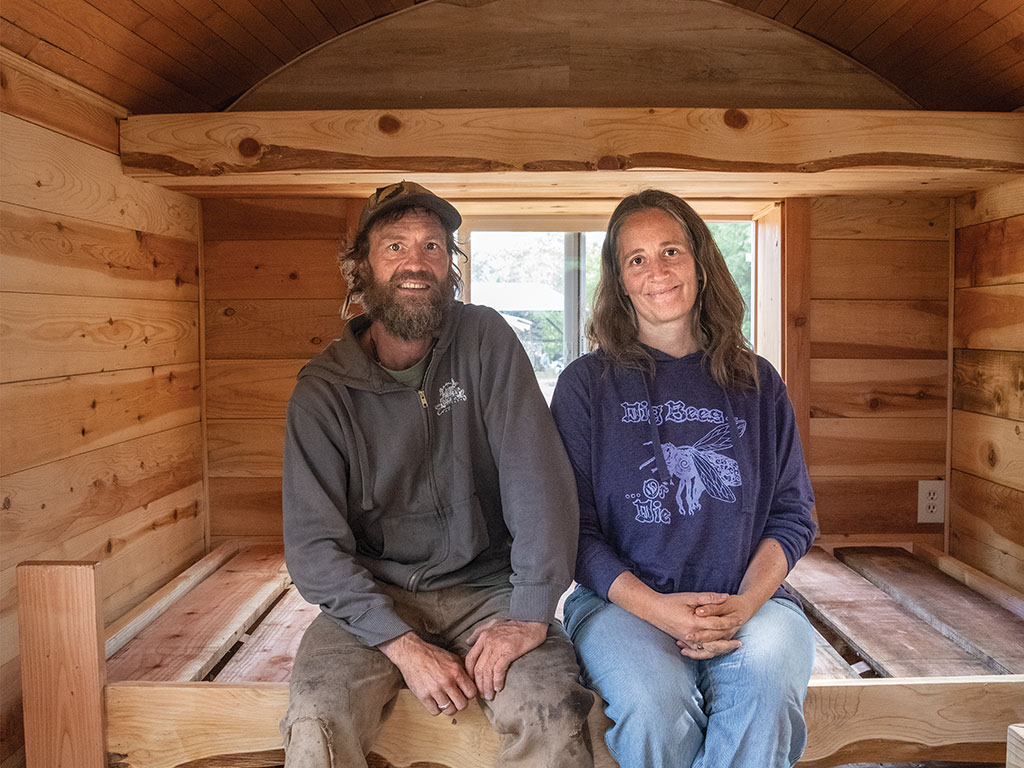Agriculture, Livestock/Poultry December 01, 2023
One Fleece at a Time
.
Single-fleece marketing puts a premium spin on fiber.
A tussle of chocolate, khaki, lead, and cream, the fleece from a Romney lamb named Nuance just begs to be stroked and squeezed. There's a card right on top, with the date Nuance was sheared and data on the fleece's fiber length (3 inches) and thickness (28 microns, or half to one-quarter the diameter of a human hair).
The card also guides hand-spinners with enthusiastic comments: "So soft! This girl has color, crimp, style...spin raw or scour." It's as ebullient and encouraging as the tasting notes at the wineries a stone's throw from Nuance's home at Iron Water Ranch outside Albany, Oregon.
Like the makers of fine wines, Kirsten Holbo and the Iron Water Ranch team offer their clientele something unique to the farm: naturally colored fleeces that can fetch $50 to $500 apiece.
Marketing colored fleeces is swimming against the tide in an industry built on commodity white wool priced by the penny.
"We always direct marketed it because there didn't used to be—and there still is not—a commercial market for naturally colored wool at all," Holbo says.
Even super-fine, high-quality colored fiber is virtually worthless on the commodity wool market, notes Holbo's daughter, Zane Van Horsen, who inherited her mother's marketing savvy and love of colored sheep.
Above. This beautiful blend of natural colors in a Romney fleece is a pattern called Morrit. In addition to breeding stock, show lambs, and individual fleeces, Iron Water Ranch offers skeins of yarn to knitters. (Third image from left) Zane Van Horsen, Brendan Murphy, and Kirsten Holbo and Iron Water Ranch's other shepherds have become teachers to fellow sheep raisers as well as non-farming visitors.
Black sheep. Holbo established Iron Water Ranch in 1984, just as Oregon's sheep industry went into a tailspin.
"In 1980, sheep were the number-four commodity in Oregon," she points out. "By 1996, they were 32nd on the list."
The loss of slaughterhouses, auction barns, renderers, and sheep experts to guide producers fed the crash. Undaunted, Holbo kept importing Romney genetics from New Zealand, where she spent a year as an exchange student learning to class wool and seeing the potential of the breed.
She bred her Romney flock not just for unique color patterns like Nuance's lively Moorit fleece, but also for hardy feet, good mothering, fine fiber, and a tolerance for western Oregon's wet winters.
Iron Water Ranch also tends flocks of Merino, Horned Dorset, Bluefaced Leicester, Columbia, Corriedale, Romeldale, and Babydoll Southdowns. In all, as many as 1,000 Iron Water sheep are spread across the 16-acre home place, 140 acres across the road, and hundreds of acres of nearby grass seed fields.
As Iron Water Ranch grew and the local infrastructure for sheep shrank, Holbo and her children Zane and Kieran found a market for their deep expertise.
Prospective lamb buyers wanted to learn how to raise sheep. New spinners were asking for instructions. And a barn full of some of the world's cutest lambs was a powerful magnet for non-farm neighbors and guests—both through the ranch's social media channels and in-person.
"Our main focus currently—besides hopefully making money selling wool and super- high-quality purebred breeding stock—is actually the education component," Van Horsen notes.
The ranch maintains a packed calendar that starts with Lambing School in January, a crash course backed up throughout the year by Shepherding 101 classes.
In February, Lambentine's Day brings in families and groups of friends to spoil bummer lambs with endless cuddles and bottles.
March Maaadness brings in another round of paying guests and tops the festivities off with a Sweet 16 bracket for cutest lamb. (A title doesn't hurt when it's time to sell breeding stock.)
Folks new to handling lambs are briefed by the staff on how to hold and feed the sheep, and educated on sheep production.
"It's a nice way to introduce people to sheep and agriculture," Van Horsen says. "It isn't like just going and seeing them at the fairgrounds where you don't get to experience their personalities or hang out with them."
Novice guests have another chance to visit on April Floof's Day before Iron Water shifts back to a professional sheep crowd with its May stock sale.
At Fall Fiber Fest, fleeces and yarn take center stage with fiber arts demonstrations and classes.
Like its long emphasis on colored sheep, taking on the roles of educators and ambassadors has influenced every aspect of Iron Water Ranch, including breeding.
"We've shifted some of our production models," says Van Horsen. "We still want them to be great moms. We still want them to be super structurally sound and meet their breed standards. But we also want them to be a bit friendlier than we used to. I need them to be the things we want to present to the world." ‡
Read More

SPECIALTY/NICHE, SUSTAINABILITY
Bee-ing Resilient
Oregon couple tunes into bee medicine, biodynamic bees.

AGRICULTURE, LIVESTOCK/POULTRY
Good Cheeses Make Good Neighbors
It's easy to make friends when you bring cheese.




